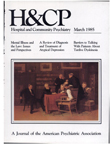A Retrospective Study of Alcohol Use by VA Psychiatric Inpatients
Abstract
Psychiatric inpatients are prone to the use of alcohol, often in attempts to self-medicate. A retrospective review of patient records in a Veterans Administration neuropsychiatric facility identified 28 patients for whom use of alcohol was documented while they were in the hospital; the number of episodes totaled 47. The patients tended to be young and unmarried and to have a diagnosis of scbizophrenia. The study found a trend toward underreporting of alcohol use by hospitalized patients because staff believe it to be an accepted part of adult life in American society. Possibly because staff do not identify alcohol use as a serious problem for psychiatric inpatients, it is not considered in treatment planning. The authors conclude with recommendations for management of inpatients who use alcohol.
Access content
To read the fulltext, please use one of the options below to sign in or purchase access.- Personal login
- Institutional Login
- Sign in via OpenAthens
- Register for access
-
Please login/register if you wish to pair your device and check access availability.
Not a subscriber?
PsychiatryOnline subscription options offer access to the DSM-5 library, books, journals, CME, and patient resources. This all-in-one virtual library provides psychiatrists and mental health professionals with key resources for diagnosis, treatment, research, and professional development.
Need more help? PsychiatryOnline Customer Service may be reached by emailing [email protected] or by calling 800-368-5777 (in the U.S.) or 703-907-7322 (outside the U.S.).



